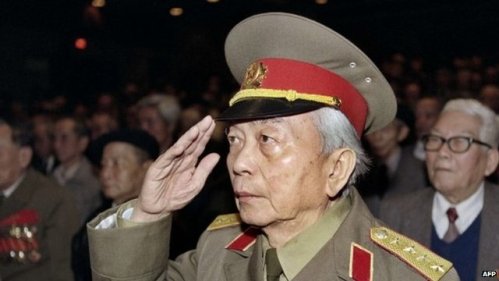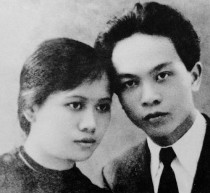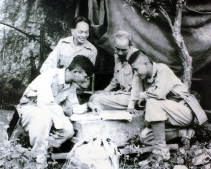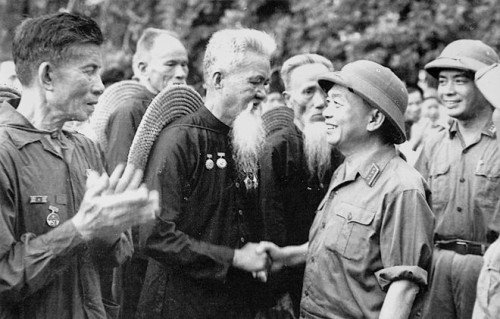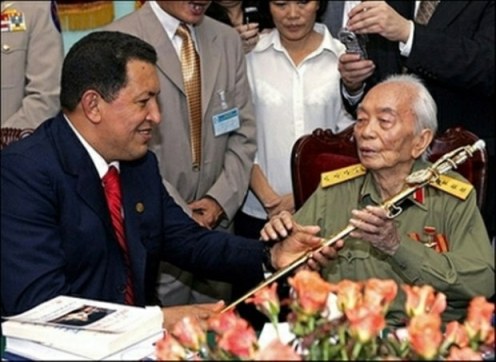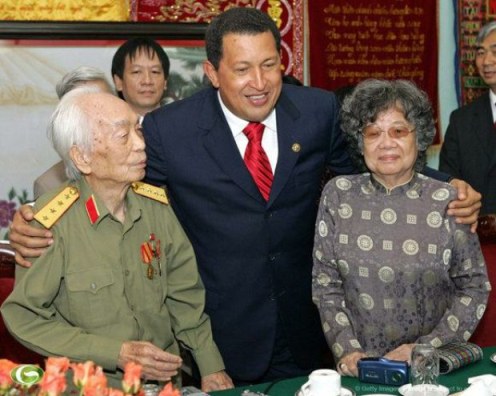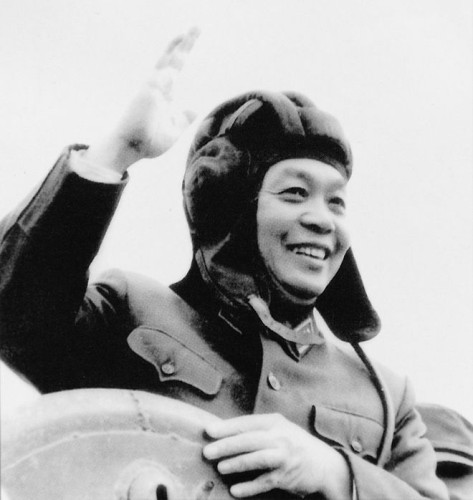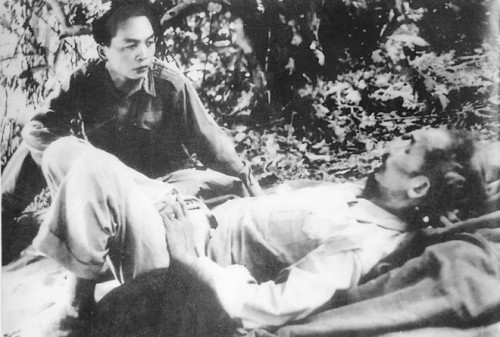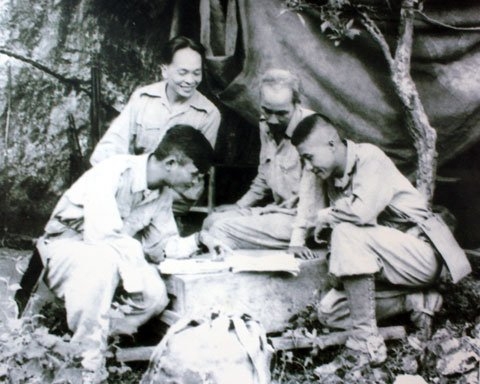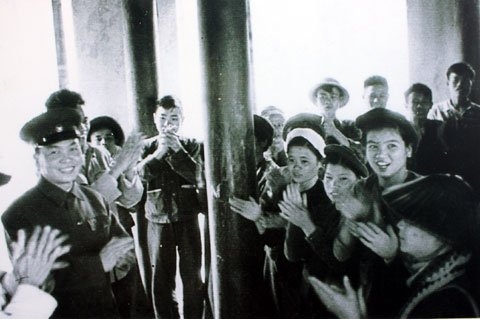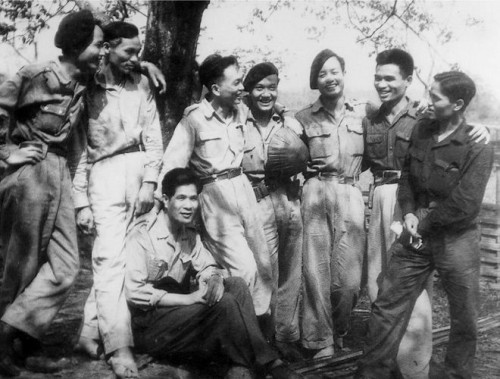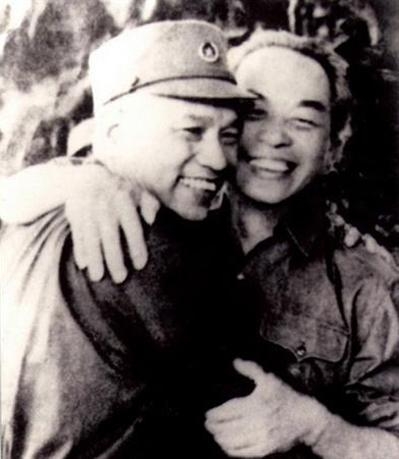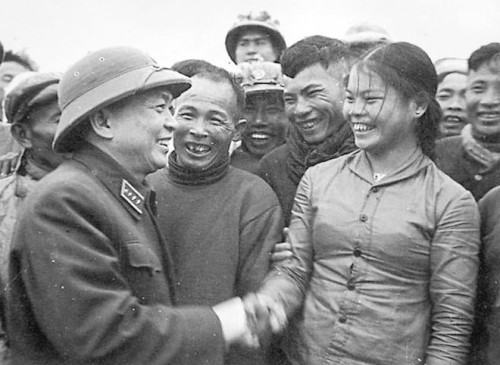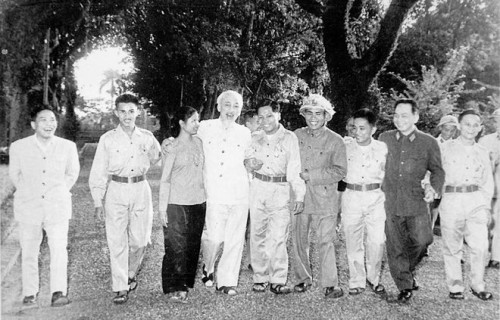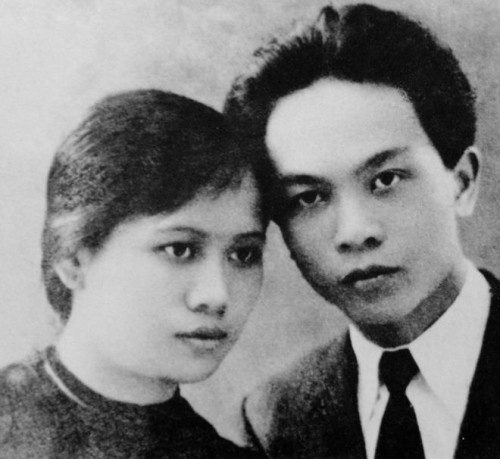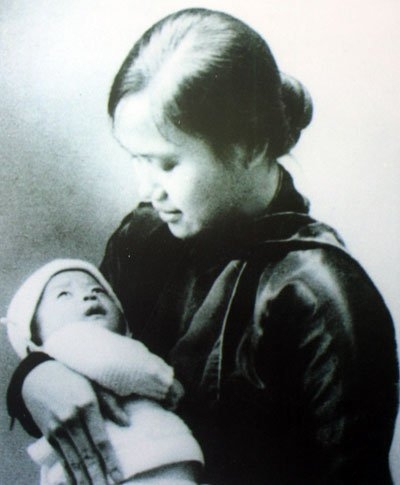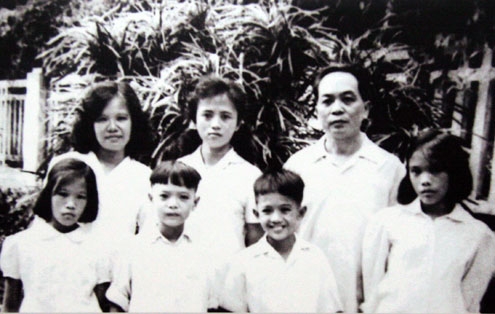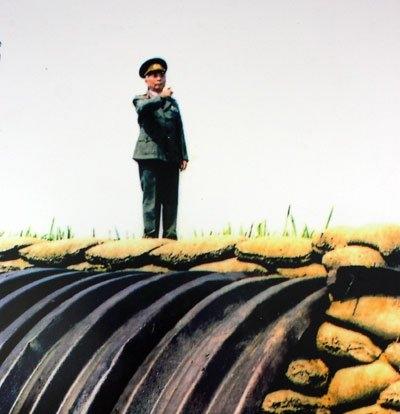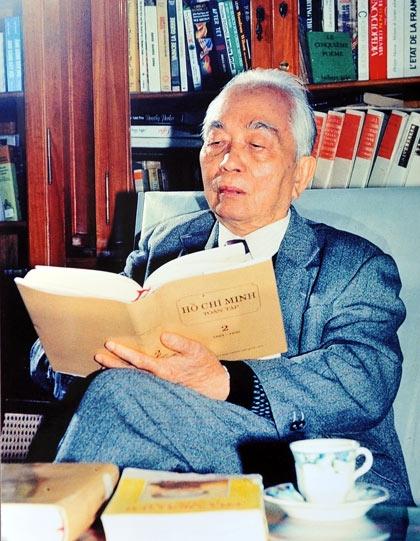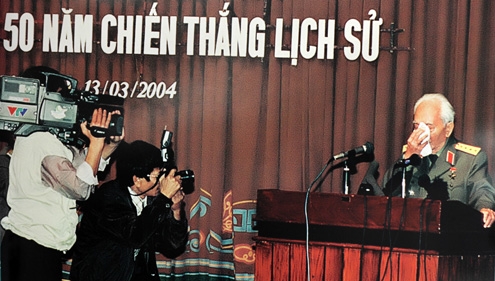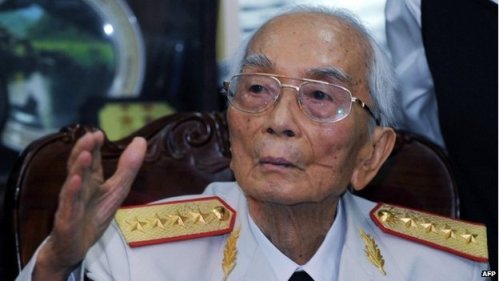|
Axis of Logic
Finding Clarity in the 21st Century Mediaplex
Axis of Logic Special Report
Valiant General, Loyal to his People, General Vo Nguyen Giap.
By Les Blough. Axis of Logic (memorial and photo essay)
Axis of Logic
Monday, Oct 7, 2013
“The enemy may outnumber you 10 to one, but if you compel him to disperse his forces widely you may outnumber him 10 to one locally, wherever you choose to attack him.”
- General Vo Nguyen Giap |
His name is written in the military hall of fame alongside socialist leaders like Mao Tse Tung, Fidel Castro, Che Guevara and Hugo Chávez* and he died on Friday at the age of 102. General Vo Nguyen Giap is known worldwide for masterminding the defeat of of the French forces in what was then called Indochina at Dien Bien Phu in 1954, ending the French occupation and the defeat of the United States, routing them Vietnam in 1973. (*see Chávez visit with General Giap with photos, below.)
Early years and education
General Giap was born in 1911 in Quang Binh Province in central Vietnam which was then part of Indochina, occupied by the French. His parents named him, "Vo" which translates into "force"
and his last name, "Giap," which translates to "strong armor."His father was a literate rice farmer who taught his children to read, encouraging and supporting their higher education. Giap as a 14 year old student joined an underground
movement, determined to rout the French from his country. He never received formal military training but his father sent Giap to study history at the French college at Hue where he was later expelled.
Before his 18th birthday, the French arrested Vo Nguyen Giap for fomenting revolution after he joined the Indo-Chinese Communist
Party, founded by Ho Chi Minh in 1930. After leaving prison he continued his education at Hanoi University where he studied politics and law. Throughout the
1930s he deepened his knowledge of military strategy while earning a living as a journalist and professor.
After earning his doctorate in law at Hanoi University, he taught history in a private school in Hanoi. As professor he had a particular interest in the military strategies and tactics of Napoleon which impressed his students, one them remembering that he could sketch out Napoleon's most famous battle plans from memory. Later he studied the military strategy and tactics of Mao Tse-tung, founding father of the People's Republic of China and Chairman of the Communist Party of China.
Political background
|
|
The General and his first wife, Mrs. Quang Thai. She was born in 1915 and was tortured and died in a French prison in 1944 after Giap went into exile in China.
|
In 1939 the French banned the Communist Party and Giap went into exile in China. The French responded by imprisoning Vo Nguyen Giap's wife who had a newborn child and other Giap family members where they were tortured and left to die in prison. While in China, Giap met Ho Chi Minh for the first time and in 1941 the two revolutionaries renamed the party, forming the Vietnam Doc Lap
Dong Minh Hoa (the League for the Independence of Vietnam) which came
to be known as Viet Minh whose sole purpose was to rid the country of the
French occupation (circa 1938), unify and win independence and sovereignty for Vietnam.
Imprisonment and torture of Giap's family: According to Cecil B. Currey, General Giap's biographer, the French tortured and murdered Giap's wife and his wife's sister. After his exile to China, Quang Thai and her sister Minh Khai sought refuge in their home village of Vinh. The French tracked them down and arrested Minh Khai in July, 1940. In prison the French beat her savagely trying to force her to give details about her comrades in Communist Party
and their activities. She refused to tell them anything and they shot her, blindfolded, at Hoc Mon,
near Saigon on April 25, 1941. She screamed her last words, "Long live the Communist Party of Indochina. Long live the victorious Vietnamese revolution."
Quang Thai placed her 18 month old daughter, Hong Anh, in the care of her younger sister moments before her arrest. Later, General Giap's parents took the child and became her surrogate parents. The French jailed Quang Thai in the Hao Lo prison in Hanoi and tried her before their military court. She was sentenced to life at hard labor and tortured. According to the French account of her death she committed suicide by swallowing "giai rut" - a soft belt material. But US intelligence reports say that the French hung her up by the thumbs and beat her to death. She died in 1941 a few weeks after the French shot her sister.
Military Commander and General
President Ho Chi Minh awarded Vo Nguyen Giap rank of General when he was 37 years old. His defeated enemies called him "brutal" and he was known by his troops as "The Volcano." He gained an international reputation as a brilliant strategist who
planned and executed victories against forces which greatly outnumbered his army and were technically far better
equipped.
Japan In 1944 Giap returned to Indochina (Vietnam) from his exile in China and organized
the resistance to wage a guerilla war against Japan's occupation of the
country. The Imperial Japanese Army entered the French soup in Indochina by invading
and occupying the country to fight their ongoing mortal enemy, the
Republic of China which was supporting Ho Chi Minh's forces. This of course led to a confrontation with the French
and when the Japanese army invaded with troops supported by a flotilla
of ships and planes from aircraft carriers and air bases on September 5,
fighting began between the French and Japanese. 17 days later, the
French signed an agreement granting Japan to station 6,000 troops in
Indochina and 4 days after that Japan occupied an airbase, railroads and
a port, remaining in Indochina until the end of WWII.
Meanwhile, in Vietnam's northern jungles, General Giap assembled a fighting unit consisting of only only 34 men, 2 revolvers, one light machine gun, 17 rifles and 14 flintlocks, according to his biography. Giap and his 34 men took a solemn oath to fight to the death to free Vietnam from foreign occupation and he built the tiny group into a fighting force that became known as the Vietnam People's Army which had 5,000 armed soldiers fighting the Japanese until their surrender in 1945.
Defeat of the French
|
|
President Ho Chi Minh, General Vo Nguyen Giap and regiment commander Thai Dung (left) research the border campaign map in 1950.
|
The French occupation and colonial rule had its beginnings in 1887 and 54 years years later in 1941 Ho Chi Minh's Viet Minh forces began their armed resistance. Four years later Hanoi fell and Ho proclaimed the Democratic Republic of Vietnam and appointed General Giap as his new interior
minister. But by September, 1945 British, French and Japanese forces restored French control in great numbers. General Giap responded with a hit-and-run strategy against them, attacking several locations at once and taking one French position after another. He finally defeated them after 9 years in the famous Battle of Dien Bien Phu (DBP) in 1954.
Battle of Dien Bien Phu: The French parachuted 12,000 troops into a trap Giap laid for them in the valley of DBP. They surrendered after 2 months of Giap's bombardment from the surrounding hills leaving 4,000 French soldiers dead in a single battle and that ended the French occupation of Vietnam. Giap later memorialized,
| "It was the first great victory for a weak, colonized people struggling against the full
strength of modern Western forces. This is why it was the first great
defeat for the West. It shook the foundations of colonialism and called
on people to fight for their freedom. — it was the beginning of international civilisation." |
Defeat and humiliation of the United States
“The aggressor army of the U.S. imperialists, although over-supplied
with arms and ammunition, cannot escape the doom that has befallen the
other invaders on this soil.”
- General Vo Nguyen Giap, 1972
|
The defeat of the French left the country divided into the North and South and an agreement was reached in the Geneva Accords that elections would be held for all Vietnamese to decide in 1956 the future government of a unified country. The agreement stated that the elections would be "internationally supervised" - as though the Vietnamese people were incapable of holding their own elections without foreign assistance if left to themselves.
Ho Chi Minh's army had already advanced far into the south while fighting the French but he agreed to the Geneva resolution and confident they could win in a free election he retreated his positions to north of the ceasefire line awaiting unification. But by then the United States already had their own plans for Vietnam and refused to sign the document. Secretary of State John Foster Dulles under President Eisenhower returned from the Geneva Conference stating in a speech,
"What started as a civil war has now been taken over by international communism for its own purposes. Ho Chi-Minh, the Communist leader in Viet-Nam, was trained in Moscow and got his first revolutionary experience in China ... The Governments of Viet-Nam, Laos, and Cambodia had not yet received full political independence. Their peoples were not adequately organized to fight against the Communist-led rebels, and they did not feel that they had a stake in the struggle which justified great sacrifice."
|
In
1965 the United States invaded Vietnam thinking they could do what the French failed to do, much like they invaded Afghansitan after the Soviets' defeat. The US sold their war at home by concocting the dominoe myth that if Vietnam were unified even by a democratic election, all of Southeast Asia would fall to communism. It's interesting that they also used the ruse of protecting the southern opposition just as they have done in Iraq, Libya and Syria and tried but failed to do in Iran, Russia and Venezuela from 2003 to 2013. The US first infiltrated South Vietnam with weapons and military advisors and
influenced their politicians to renege on the vote for
reunification. A group of nationalists in the South responded by forming the National Liberation Front or the "Viet Cong" as the US called them.
General Giap committed whole divisions of
North Vietnamese soldiers to support the National Liberation Front in the south when the US invaded in 1965. At that time he was Minister of Defense and Commander in Chief of North Vietnam. If he had one fundamental principle underlying his military strategy it was endurance and he stated of the Americans:
| "To fight a protracted war is a big defeat for them. Their morale is lower than the grass." |
|
|
| The General with the team of old militias who shot down a US plane with a rifle. The photo was taken in the Hoang Hoa district of Thanh Hoa province on National Day, 1973. |
The Tet Offensive: Because of Giap's brilliant leadership and the commitment and sacrifice of the Vietnamese
people, the North was defeating the US in battle after battle despite the size and power of the US military. Coinciding with "Tet," or the Lunar New Year in 1968, the National Liberation Front and North Vietnamese forces attacked more than 40 provincial
capitals, went into Saigon and even entered the US embassy. They lost more than 15,000 men and women and the Tet Offensive was
a huge psychological and military blow for the United States and caused increased protests in the US. The combination brought about panic in Washington and Saigon and the US left Vietnam with their ass on fire in 1973. Two years later in
1975 Ho Chih Minh took Saigon and unified the country as the Socialist
Republic of Vietnam.
Spitefully, General Westmoreland, the defeated US commander who presided over the millions killed in Vietnam later stated that General Giap had, "such a disregard for human life," saying he "may make a
formidable adversary but it does not make a military genius." But Westmoreland's humiliation and hatred are transparent as many other military commanders around the world, friends and enemies alike, have respected and honored General Giap ever since his defeat of the French and the United States. Among them was Venezuela's Commandante, Hugo Rafael Chávez Frías.
General Giap and Chávez: In 2006, Chávez visited General Giap in Hanoi. There they commemorated military exploits in general, exchanged views on the global situation, the Vietnamese experience with socialism and projections of the Bolivarian Revolution. Chávez said he studied Giap's military thinking deeply and that one of his dreams would have been to serve under his command, "as a simple soldier in the conquest of freedom and socialism." After Chávez' death, General Giap sent a letter to the government and people of Venezuela saying in part,
| "The departure of President Hugo Chávez, the hero of Venezuela, has been
a great loss to the Revolution and the struggle for human liberation,
not only in Latin America but also in the world. Although the heart of this excellent son of Latin America stopped
beating, his oeuvre and his noble ideals will live forever in the hearts
of friends and the progressive peoples of the world." |
|
|
During his visit with General Giap, then President Hugo Chávez gave a replica of the sword of Bolivar, the Liberator to the legendary general of Vietnam.
File Photo The Voice of Vietnam
|
|
|
President Hugo Chávez with General Vo Nguyen Giap and his wife of 64 years, Dang Bich Ha, in Chávez' official visit to Vietnam in 2006.
File Photo The Voice of Vietnam
|
After the US war in Vietnam
After the war, General Giap retained his position as Minister of
Defence and was appointed Deputy Prime Minister in 1976, retiring from
government 6 years later. He was removed from the Politburo in the early 1980s and formally left the political stage altogether in 1991. But until the end he had a clear mind and engaged in Vietnam's current
affairs and politics, meeting world leaders and speaking out against imperialism for the independence and sovereignty of Vietnam and all nations. Since the war he published a number of books on military strategy. Until his death on Friday, he was regarded as one of the most brilliant military strategists of all time and a living legend. Somewhat ironically, in his later years he lived in a former French villa, a short walk from the mausoleum of his lifelong friend and comrade, Ho Chi Minh. He moved to live in a military hospital in Hanoi for the last 3 years of his life. He is survived by his second wife, Dang Bich Ha and four children. General Vo and Dang Bich Ha were married for 64 years and had 3 daughters and 2 sons.
HISTORICAL PHOTOS
|
|
Vo Nguyen Giap (L) as a young soldier. At the age of 37, Vo Nguyen Giap was awarded the rank of General by President Ho Chi Minh
|
|
|
The General during a visit to an armored unit.
|
|
|
In 1950, on the way to the border campaign, General Giap paid a visit to President Ho Chi Minh in the jungle.
|
|
|
| President Ho Chi Minh, General Vo Nguyen Giap and regiment commander Thai Dung (left) research the border campaign map. |
|
|
General Vo Nguyen Giap paid a visit to Nguyen Xa village in Thai Binh province in 1955.
|
|
|
General Giap talks with soldiers during free time.
|
|
|
The General with the team of old militias who shot down a US plane with a rifle. The photo was taken in the Hoang Hoa district of Thanh Hoa province on National Day, 1973.
|
|
|
General Vo Nguyen Giap meeting with General Van Tien Dung in May, 1975
|
|
|
General Vo Nguyen Giap paid a visit to Nguyen Xa village in Thai Binh province in 1955.
|
|
|
General Vo Nguyen Giap with workers of the transport boat team on Gianh River (Quang Binh) in 1968.
|
|
|
General Vo Nguyen Giap, President Ho Chi Minh and Deputy Prime Minister Pham Hung with the delegation of the Southern Liberation Army (11/01/1965).
|
|
|
The General and his first wife, Mrs. Quang Thai. Thai was also the
younger sister of revolutionary Nguyen Thi Minh Khai, the mother of Dr.
Vo Hong Anh. She was born in 1915 and she and Vo had a newborn baby when she was imprisoned by the French after Vo went into exile in China. The French tortured Mrs. Quang Thai in prison where she died 1944.
|
|
|
General Vo Nguyen Giap’s wife and daughter.
|
|
|
General Vo Nguyen Giap, his second wife – Dang Bich Ha and five children: Vo Hong Anh, Vo Hanh Phuc, Vo Dien Bien, Vo Hong Nam and Vo Hoa Binh (1963).
|
|
|
General Vo Nguyen Giap stood on the roof of General De Castries’ trench, recalling the Dien Bien Phu Victory of 50 years before.
|
|
|
General Vo Nguyen Giap reading Selected Works of Ho Chi Minh
|
|
|
At the meeting to celebrate the 50th Dien Bien Phu Victory, the General could not hold his tears when he talked about the martyrs.
|
Many more wonderful photos at the Vietnamese website, Vietnamnet
REFERENCES
- General Giap: military genius, humbler of the WestGeneral Vo Nguyen Giap
- Vo Nguyen Giap, Vietnam General Who Beat French
- Thirty-Eighth Army (Japan)
- Japanese invasion of French Indochina
- Vietnamese General Vo Nguyen Giap Dead At 102
- Vietnam's legendary General Vo Nguen Giap
- French Indochina
- Geneva Conference (1954)
- Victory at Any Cost: the genius of Viet Nam's Gen. Vo Nguyen Giap by Cecil B. Curry
- The Geneva Converence
- Indochina - Midway in the Geneva Conference: Address by the Secretary of State, May 7,1954
- Indochina -The Consequences of Direct Chinese Communist Intervention in Indochina: Address by the Secretary of State, September 2, 1953 (Excerpt)
- Battlefield Vietnam: A brief history
- Venezuela Public Television
- Historical photos of Legendary General Vo Nguyen Giap
|
|
